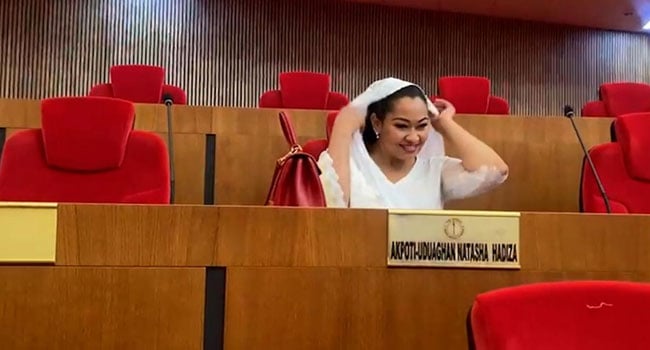The Senator representing Kogi Central, Natasha Akpoti-Uduaghan, on Tuesday resumed legislative duties at the National Assembly after months of suspension, describing Senate President, Godswill Akpabio, as a “dictator.”
Her return followed the unsealing of her office, located in Suite 2.05 of the Senate Wing, by the Deputy Director of the National Assembly Sergeant-at-Arms, Alabi Adedeji.
Upon resumption, Senator Natasha, who has been on suspension, remained resolute, insisting that she has “no apology to tender.”
She said, “In retrospect, it is actually amazing how much we have had to pay in the past six months, from the unjust suspension to the recall. But we survived the recall, blackmail and that crazy lady on Facebook.
“It is amazing what we had to pass through, and I give God Almighty the glory and my deepest appreciation to the people of Kogi Central and Nigerians at large. To my husband, I love you dearly. I pray all men support their wives in the same manner you have supported me.
“In everything, sometimes it is good to push the institution to the test. We can’t cower in the face of injustice. No one is more Nigerian than us. Senator Akpabio is not more of a senator than I am. He is not the governor of this place, yet he treated me as if I were a servant or domestic staff in his house.
“It is so unfortunate that we will have a National Assembly being run by such a dictator. It is totally unacceptable.”
The office had been locked since March 6, 2025, when the lawmaker was suspended from the Red Chamber.
In a video shared on Tuesday, Adedeji was seen removing the seal.
“I, Alabi Adedeji, Deputy Director, Sergeant-at-Arms, hereby unseal the office. The office is hereby unsealed. Thank you,” he declared.
Upon resumption, Akpoti-Uduaghan, who has been at the centre of a protracted standoff with the Senate leadership, maintained her defiance, stressing that she had “no apology to tender.”
The embattled lawmaker was handed a six-month suspension in March, barring her from all activities of the 10th Senate over alleged misconduct during her protest against the reassignment of her seat by Senate President Godswill Akpabio on February 20.
Although her suspension formally lapsed in September, she was unable to return due to legal tussles and resistance from Senate leadership. On July 4, however, the Federal High Court in Abuja ruled that the suspension was excessive and unconstitutional.
Following the judgment, Akpoti-Uduaghan wrote to the Senate notifying it of her intention to resume duties, but the request was rebuffed by the National Assembly.
It, however, remains unclear whether Tuesday’s development restores her full privileges as a senator and if the senator will be allowed to sit with her colleagues when plenary resumes on October 7.
Meanwhile, the Senate leadership has again altered its legislative calendar, shifting the resumption of plenary sittings from September 23 to October 7, 2025.
The postponement was conveyed in an internal memo signed by the Chief of Staff to the Senate President, Chinedu Akubueze.
The shift in date has raised eyebrows within the National Assembly as it extends the chamber’s annual recess by another two weeks.
While no official reason was given, sources told our correspondent that the delay was intended to allow lawmakers to fully observe the Independence Day celebrations on October 1.
In the memo titled “Notice of Shift in Plenary Resumption Date,” Akubueze also apologised to the senators for the belated information.
It read, “This is to respectfully inform distinguished senators that the resumption of plenary sitting of the Senate, earlier scheduled for Tuesday, 23rd September, 2025, has been shifted to Tuesday, 7th October, 2025.
“Any inconvenience this short notice may cause is deeply regretted. Distinguished senators are kindly invited to note the postponement and adjust their schedules accordingly.
“Thank you for your kind understanding, and God bless.”
The Senate had adjourned plenary on July 24 for its annual recess.
At the time, the Senate President justified the move as an act of “chamber reciprocity,” since members of the House of Representatives had also embarked on a break in line with the legislative calendar.
With the latest adjustment, critical debates and pending motions—including oversight inquiries into government spending and executive appointments—will remain on hold.
punch.ng
FOLLOW US ON:
FACEBOOK
TWITTER
PINTEREST
TIKTOK
YOUTUBE
LINKEDIN
TUMBLR
INSTAGRAM






































